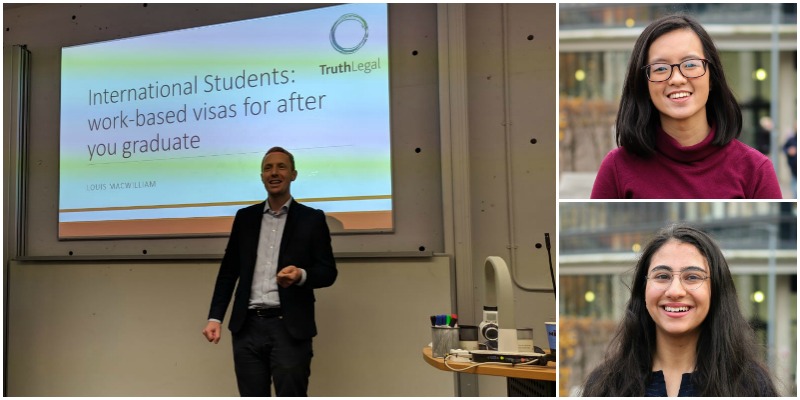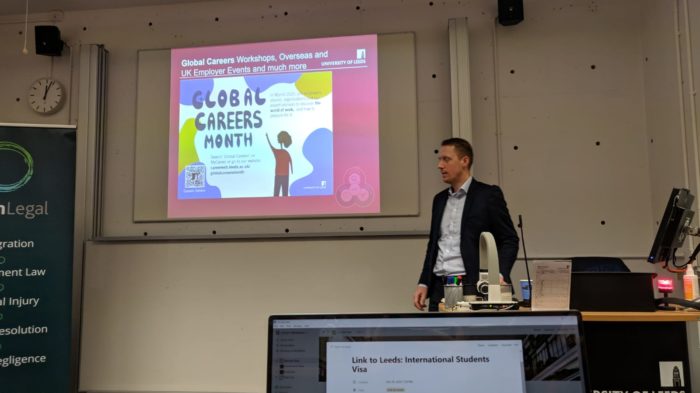Working in the UK after graduating - a guide for international students!

The Careers Centre here at the University of Leeds consists of a wide range of experts and staff that work endlessly to help you plan and make important decisions regarding your future after graduation. In addition to this, they offer support on how to improve or edit your CV to suit specific employer needs and one to one sessions with experts offering advice on your chosen career field. We reccomend that you consider all the services a university career centre will provide you before joining, you can find out more about the services at the University of Leeds Career Centre here.
March 2020 is Global Careers Month on campus and the Careers Centre have arranged a range of activities and events that include a series of webinars, workshops, move-nights and talks by potential employers and former alumni on how best to prepare for the exciting world of work. A list of all the events and how you can sign up to them are available on your careerweb webpage in Minerva when you are a student at the University of Leeds but you can find some examples here.

In the beginning of March we attended an event led by Louis Macwilliam, and immigration solicitor working who shared expert advice on the various ways in which international students can continue to work in the UK after graduation. A key point we took away from the talk, was preparation. The world of work can be frightening to think about, particularly as most of us are still deciding what we want to do. Remember, it is okay not to know exactly what you would like to do. While even thinking about what to do after graduation can be quite overwhelming, taking out half an hour of your day on a regular basis to browse the internet, looking up and taking note of potential companies and organizations that you can work for will mean that when it comes to actually having to apply for a job, you have something that you can turn too.
This makes the job-hunting process a lot less stressful and perhaps a little more enjoyable. A good source to use is the uktiersponsors website. This website enables you to put in your career field of choice then it will list a range of organizations that are able to sponsor Tier 2 Work Visas for international students. Tier 2 Work Visas is the most common visa route for international graduates. It requires your employer to have a sponsorship license, the job to be classified as a degree-level job, and a minimum wage level of £20,800 (though this salary can depend on the job and may even be higher). Louis explained that about 31,000 companies across the UK have the license to sponsor the Tier 2 Work Visa, which only makes up about 10% of the total number of companies (which doesn’t sound reassuring, we know!).
Everyone knows that securing a graduate job can be difficult and stressful, especially if staying in the UK depends on it. Fortunately, Louis explains that with the new changes in the UK’s immigration system means that applying for the visa is getting easier for students. It may not feel like it, but switching from a Tier 4 student visa to a Tier 2 work visa in the UK is easier and more straightforward now than it has ever been. Below is a general overview of the new “graduate route”, available for any international student who will complete a degree in or after the summer of 2021:
- The UK post-study work visa allows international students to stay in the United Kingdom after graduation in order to find work, for up to 2 years. In that time, visa holders can work in any job they can find, and the goal is for them to transition into a general work visa afterwards.
- After the 2 year period, students who would like extend their stay will have to apply to transfer to a ‘general work visa’ aka Tier 2 Work Visas. This means securing a job that meets the visa requirements (explained above).
While the new changes have made it slightly easier for international students to stay in the UK after graduation, it must be noted that this is only a short term answer, and students will still have proactively apply for the visa extension as well as a job that guarantees sponsorship.
However, there are some alternative options to consider if you think that the Tier 2 visa route isn’t for you. Other Visas options include: the Tier 1 Global Talent Visa, the startup and innovator Visa, a visa through Family Members, the Long Residence Visa and the Youth Mobility Scheme Visa. You can find out more about whether you are eligible to apply for any of the other Work Visas mentioned above through the following link: https://www.gov.uk/browse/visas-immigration/work-visas.
When you're a student at the University of Leeds, and maybe still feeling unsure or have concerns after graduation, the University of Leeds' International Student Office has fully qualified immigration advisers with up to date knowledge of changes to immigration law. The advisers hold drop in sessions or one-on-one meetings where they can answer any questions about visas and immigration at any stage of the visa process. It's good to make use of this resource when you're a student here.
We hope this helped give you a good brief overview of the visas routes, but do always talk to professional experts if you're taking on these routes!
